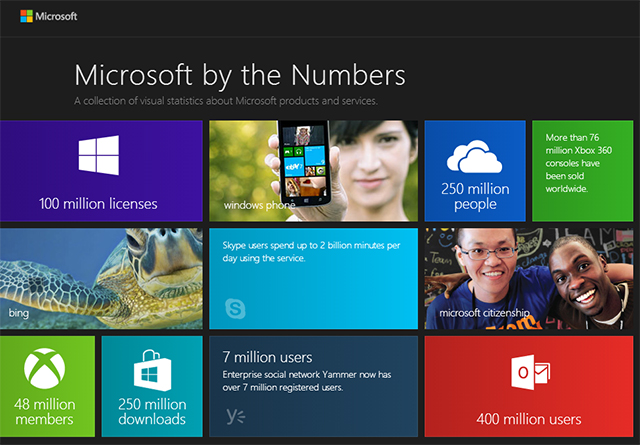
Facebook reveals details of government data requests from around the world
We’ve known for a while that governments around the world have been gathering data about Internet users, monitoring online communication via instant messaging, email and much more. Numerous websites and social networks have received requests from government bodies for information relating to their customers and users. Now, Facebook reveals for the first time just who has been asking for data.
The Global Government Request Report covers the first six months of 2013, and is introduced with the words "Transparency and trust are core values at Facebook". Although the report is not especially detailed -- it is likely that it was not legally possible to be -- it does show which countries have asked for data, the number of requests each country made, the number of user accounts inquired about, and (perhaps most interestingly) the percentage of requests that Facebook was legally obliged to comply with.

Logitech G602 mouse -- a lot of buttons and battery life
When it comes to modern PC gaming, you can never have too many buttons. Sure, there is an argument to be made that less is more on game controllers. However, hardcore-PC-gamers need any advantage they can get in today's fast-paced first-person-shooter world. Logitech is aiming to help these gamers to, well, aim, with the new Logitech G602 wireless gaming mouse ($79.99).
Logitech says, "the newest mouse in the Logitech G lineup, the Logitech G602 Wireless Gaming Mouse sets a new standard in wireless gaming. Without cords, clutter, or interference, the mouse’s lag-free wireless connection and unprecedented battery life allow better, uninterrupted game play. Featuring two modes, Performance and Endurance, the G602 Wireless Gaming mouse delivers 250 hours of non-stop battery life when in full gaming mode -- Performance mode -- and more than 1400 hours of use in non-gaming mode -- or Endurance mode".

More than two thirds of US adults have home broadband -- three percent still on dial-up
Mark Zuckerberg may be keen on making the internet accessible to everyone in the world but it appears even in the US there is still a little way to go. A report by Pew Research reveals that while 70 percent of US residents over the age of 18 have a high-speed broadband connection at home, access is not as prevalent as the Facebook founder would doubtless like.
The research center’s Internet & American Life Project has monitored broadband usage since 2000 when dial-up connections accounted for 34 percent of access and just three percent of adults used a broadband connection. Increased availability of Internet access means that 73 percent of US adults now have some form of connection at home, compared to just 37 percent 13 years ago.

Advice 5 cents: The role of mentoring in Silicon Valley
This past weekend I was invited to spend an hour talking about Silicon Valley business with a group of MBA students from Russia. They were on a junket to Palo Alto from the Moscow School of Management Skolkovo. I did my thing, insulting as many people and companies as possible, the students listened politely, and at the end there were a few questions, though not nearly as many as I had hoped for.
If you've ever heard one of my presentations the most fun tends to take place during the Q&A. That's because I can't know in advance what a group really cares about but in the Q&A they can tell me and sometimes we learn a thing or two. One question really surprised me and inspired this column: "In Silicon Valley," the MBA student asked, "it seems that mentoring is an important part of learning business and getting ahead, yet mentoring is unknown in Russia. How does it work when there is no obvious reward for the mentor? Why do people do it?"

Mark Zuckerberg launches Internet.org to help bring web access to the whole world
The Internet is thought of as being a global infrastructure that breaks down barriers, blurs physical boundaries and renders distance meaningless. But for two thirds of the world, Internet access is just not available, and this is something that Facebook founder Mark Zuckerberg wants to change.
Working in conjunction with Ericsson, MediaTek, Nokia, Opera, Qualcomm and Samsung, Internet.org is an initiative that aims to help bring web access to the five billion people who are not yet connected.

Sony announces PS4 release date
At a press conference at Gamescon, Sony revealed the information that hundreds of thousands of gamers have been waiting to hear -- the official launch date of the PlayStation 4.
And there’s not all that long to wait. In just over three months, on November 15 to be precise, the eagerly anticipated console will be made available in the US and Canada.

Internet Explorer at 18 -- Microsoft's web browser comes of age
It's a big day in anyone's life -- turning 18. The strike of the clock at midnight opens up a world of opportunity that simply did not exist before. Things may not be quite so dramatic in the life of a web browser (they can't vote, for starters), but today is a big day for Internet Explorer nonetheless; today marks the 18th anniversary of the release of Microsoft's much loved and hated browser. There's something of a nostalgia-fest underway at IE's Facebook page!
Whichever side of the fence you fall on, there's no denying that Internet Explorer has been, and continues to be, an incredibly important tool in opening up the Internet to a wider audience. Usage figures may not be quite as high as they were back in the heady days at the turn of the century when there was slightly less competition in the market, but IE continues to do well -- amazingly well considering the criticism and ridicule often levelled at it.

Google gives us all a laugh and raises money for charity with the Hangout Comedy Club
Right now in Edinburgh, the Fringe festival is taking place. Billed as the world's largest arts festival, this three week long extravaganza is home to the weird and the wacky, the silly and the serious, the new and the inventive. But what it's really known for is comedy; it's where many household names took their first steps on the road to fame, and huge numbers of big names come back year after year.
Thousands of shows take place in bars, basements, theatres, on street corners -- just about anywhere you can think of. The Fringe is famous the world over, and the Scottish capital swells in size as performers and fans travel from not only around the UK, but from all over the world. Sadly, not everyone who wants to make it to the festival is able to do so. Google thinks it has the answer in the form of the Hangout Comedy Club.

Acer announces three stunning new ultra-high resolution monitors
I’m not the sort of person who gets excited about monitors. It’s what’s on the screen that matters after all. However, I have to say Acer’s new line up of LED display models has me salivating. In fact I had to turn down the offer of a review unit because I knew I wouldn’t want to give it back afterwards.
The three models boast up to an ultra-high 2560 by 1440 WQHD resolution and offer large 27 and 29 inch screens for multitasking, and viewing two images at once -- so they can be used to replace a multi-monitor set-up if you desire.

Ashampoo Home Designer improves startup wizard, adds new design tools
Ashampoo has released Home Designer 2.0, a brand new version of its 3D home planning tool. The new release comes with a number of new features, from support for variable ceiling heights to customizable roof styles to help users plan, design and decorate their dream home both inside and out.
The program’s extended project wizard -- which aims to simplify the process of using the tool -- comes with a number of new steps in version 2.0, including the ability to enter project data such as location, planner and building contractor.

CheapCast transforms an Android device into a Chromecast device for free
Google's Chromecast streamer may not yet have set the world on fire but it is earning itself quite a following. Part of the device's appeal is its low price -- just $35 for a fairly capable plugin streaming unit -- but there are times when only free will do. CheapCast is a free app that turns virtually any Android phone or tablet (running Android 2.2 or above is the only requirement) into a Chromecast.
The app is a fairly early beta, but in terms of replicating what Chromecast has to offer, it does a reasonably good job. CheapCast does nothing, yet, to address many of the complaints about Chromecast -- such as the inability to easily stream local content -- but it does mimic the Google device's casting capabilities for the likes of YouTube and Google Play.

IFTTT gains New York Times channel to help automate news delivery -- but Pipes it ain't
Web automation service IFTTT just gained itself a new channel, adding support for no lesser an establishment than the New York Times. This means that if you don’t want to have to keep checking the NYT website to see when there is a new article in the Science section, you no longer need to. In a couple of steps it's possible to create a recipe that will send you an SMS, email or some other form of alert.
As with many of IFTTT's other channels, the New York Times has various possible triggers. In addition to the addition of an article to a particular section, recipes can also check for popular' articles, Critic's Pick movie reviews, new additions to the Best Sellers list and the addition of new events.

Bitcoin vulnerability discovered in Android -- beware of virtual thieves!
Lately, it seems like Bitcoin is under attack. Only two weeks ago, Thailand outright banned the currency. Before that, it was discovered that Bitcoin-stealing malware was spreading through Skype. Sadly, today comes the announcement that Android has a vulnerability which can expose your precious Bitcoins to thieves.
According to Bitcoin.org, "a component of Android responsible for generating secure random numbers contains critical weaknesses, that render all Android wallets generated to date vulnerable to theft. Because the problem lies with Android itself, this problem will affect you if you have a wallet generated by any Android app".

By the Numbers is Microsoft's already-out-of-date new infographic website
Do you wonder how many Windows 8 licenses Microsoft has sold? Are you kept awake at night trying to calculate how many minutes are spent speaking on Skype globally each day? Intrigued to learn how many pageviews MSN gets each month? Well fret no more! The answers to all of these ponderings and plenty more besides can be found on Microsoft's new By the Numbers website.
In a break from the usual look of Microsoft sites, the modern styling of Windows 8 is used here to produce an interactive infographic that does an excellent job of blowing Microsoft's trumpet. The tiled interface mimics that found on Windows 8's Start screen, but the difference here is that live tiles are used to display key statistics about various areas of Microsoft's business.

Hackintosh -- a meager man finally gets his Mac
I’ve never owned a Mac before, but I’ve secretly wanted one since the release of OS X. The first time I tried the operating system was at CompUSA where I was a salesman. I regularly sold iMacs, iBooks, PowerBooks, Mac Minis and eMacs. The people that came to the Apple section of the store always seemed very odd -- they dressed weird and were loyal to Macintosh as if it were a religion. However, as odd as the people were, they were also very computer literate -- the same could not be said for the average eMachines or Compaq buyer.
Sadly, like many people, Apple hardware has always been too expensive for me -- I live meagerly. And so, I had to settle for Windows. There was nothing bad about Windows per se, but it lacked the cool-factor that the Apple computers had. Plus, I like to build computers and upgrade them. Something like a Mac Mini was affordable but not upgradeable -- a major turnoff.